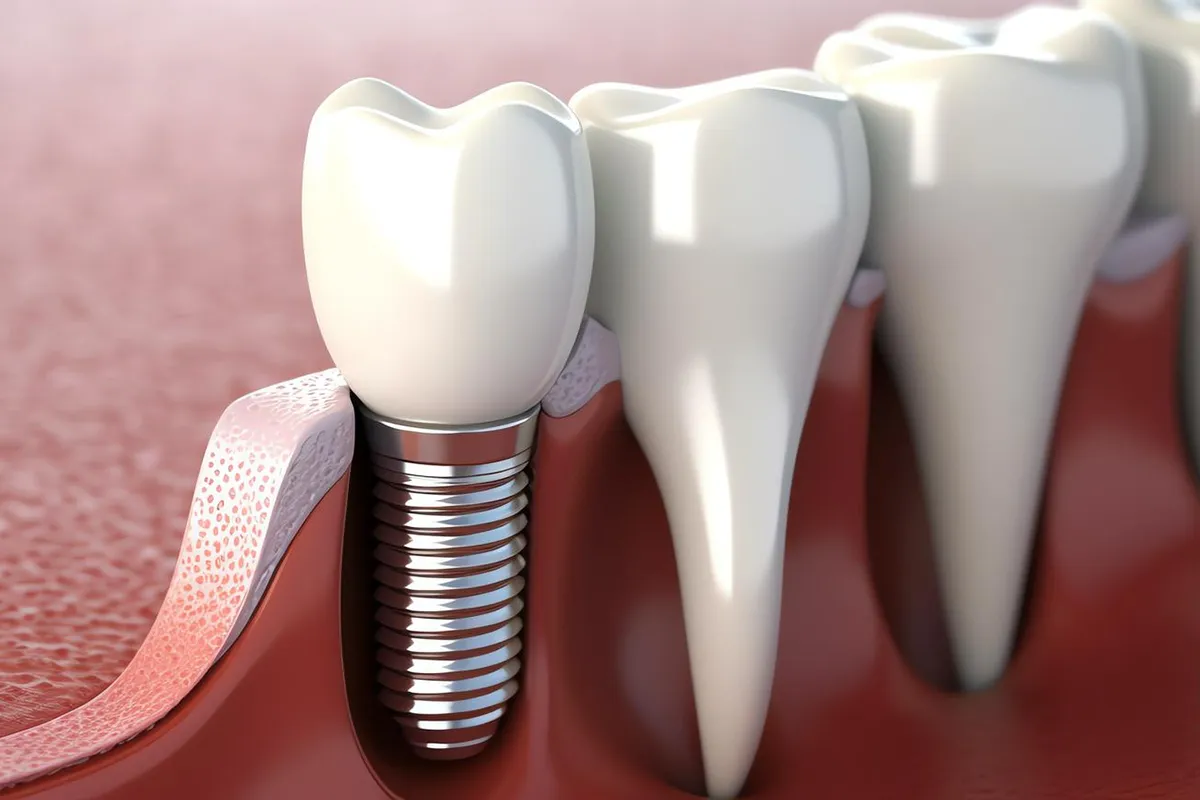Dental implants have become a revolutionary option for those searching for a reliable tooth replacement method. The effectiveness of the implant is dependent on the careful selection of materials, with each material chosen for its unique properties. With the advancements in technology, the field of dentistry is constantly evolving and improving. Various treatment options are now available to restore tooth functionality and enhance natural smiles.
Titanium is a primary material that plays a pivotal role in dental implants. Renowned for its exceptional biocompatibility, titanium fosters osseointegration. Osseointegration is a crucial process where the implant fuses with the surrounding jawbone. This seamless integration provides stability and support for the prosthetic tooth, mimicking the natural structure of a tooth root.
The strength and durability of dental implant materials are essential considerations. Beyond titanium implants, materials like Zirconia, a ceramic, are gaining prominence. Zirconia implants are known for their strength and aesthetic appeal, offering an alternative for those who may be allergic to metal or prefer a metal-free option.
Moreover, it’s crucial to consider the vital role of corrosion resistance. Dental implants encounter challenges in the oral environment, dealing with acidity and moisture. Corrosion-resistant materials, such as titanium and certain ceramics, ensure the structural integrity of the implant, preventing degradation over time.
The choice of materials in dental implants goes beyond mere functional considerations; it also extends to the aesthetic aspect. Patients often seek implants that restore function and closely resemble natural teeth. Implant procedures are more satisfying with the realistic look and feel of modern materials.
Significance of the Dental Implant Materials:
The materials used in dental implants are central to their success, impacting biocompatibility, osseointegration, strength, aesthetics, patient comfort, and overall longevity. Dentists carefully select materials based on individual patient considerations to ensure optimal outcomes in terms of both function and appearance. Here are the critical roles associated with these materials:
Biocompatibility:
The material’s ability to integrate harmoniously with the body’s tissues is crucial. Materials that are compatible with the body, like titanium, facilitate osseointegration. It binds the implant with the jawbone, ensuring stability and support.
“Biocompatible materials like titanium have made dental implants more successful. This has led to a 4.1% increase in implant surgeries worldwide yearly”.
Osseointegration:
This process, facilitated by biocompatible materials like titanium, ensures a strong and stable connection between the implant and the jawbone. It mimics the natural attachment of a tooth root to the bone.
Strength and Durability:
The materials must withstand the forces exerted during biting and chewing. Titanium, known for its strength and durability, provides a robust foundation for dental implants, ensuring their long-term functionality.
Corrosion Resistance:
The oral environment is dynamic, with exposure to acids and moisture. Materials with corrosion resistance, like titanium, prevent degradation over time, maintaining the structural integrity of the implant.
Aesthetics:
The appearance of the materials used in dental implants directly impacts the restoration’s aesthetics. Tooth-colored materials, such as Zirconia, contribute to a natural and pleasing look, especially for visible areas in the mouth.
Patient Comfort:
Using biocompatible and non-reactive materials contributes to patient comfort. Materials like titanium are well-tolerated by the body.
Versatility:
Different materials offer flexibility in addressing diverse patient needs. For example, Zirconia provides a metal-free alternative for individuals with metal sensitivities, expanding the range of patients who can benefit from dental implants.
Longevity and Success Rates:
The chosen materials influence dental implants’ overall success and longevity. High-quality materials contribute to the stability and effectiveness of the implant, leading to favorable long-term outcomes.

Best Material for Dental Implants:
The “best” material often depends on individual patient factors and the location of the implant. Titanium remains the most widely used and researched material, with a long history of successful outcomes. It is a robust and reliable choice for most cases. On the other hand, Zirconia may be preferred for its aesthetic qualities and in situations where patients choose a metal-free option.
Dentists carefully evaluate each patient’s unique circumstances, considering factors such as oral health, medical history, and patient preferences when determining the most suitable material for dental implants.
- For the implant fixture, commonly called the post, titanium or titanium alloy is widely favored. Renowned for its exceptional biocompatibility, titanium fosters osseointegration. In turn, it provides a robust and stable foundation for the implant.
- Moving to the abutment, the connector piece between the implant and the final restoration, the choice often lies between titanium and Zirconia. Titanium abutments, recognized for their strength and compatibility with osseointegration, are commonly used, especially in traditional implant restorations. On the other hand, zirconia abutments are preferred for their aesthetic appeal, offering a tooth-colored option particularly suitable for visible areas, such as the anterior region of the mouth.
- Finally, the material for the final restoration, whether a crown, bridge, or denture, depends on various factors. Dentists pick materials like Porcelain-fused-to-metal (PFM) or all-ceramic options such as zirconia and lithium disilicate for crowns and bridges. This choice aims to find a balance between strength and appearance. They might use acrylic or hybrid materials to make implant-supported dentures look natural.
Choosing the Suitable Material:
The dentist decides on materials, considering each patient’s unique circumstances and preferences. As dental technology evolves, new materials may emerge, offering even more tailored solutions for implant dentistry.
Patients must thoroughly discuss their needs with their dentists to make an informed decision. Dentists consider a patient’s oral health, lifestyle, and preferences when recommending the most suitable material for dental implants. Here is a quick guideline on choosing the appropriate material for dental implants:

Location of the Implant:
Patients may prefer Zirconia for its aesthetic qualities for implants in visible areas.
Biocompatibility:
Both materials are generally biocompatible, but individual responses can vary. Patients with metal sensitivities may consider Zirconia.
Strength Requirements:
Titanium is known for its strength and durability, making it suitable for implants in areas that undergo significant biting and chewing forces.
Patient Preferences:
Patient input, including aesthetic preferences and concerns, plays a role in material selection.
Are Dental Implant Materials Safe?
While these materials are generally safe, it’s essential to consider individual patient factors and potential contraindications. Patients with specific allergies or sensitivities should communicate these concerns with their dentists, who can then make informed decisions about suitable materials.
Additionally, the success of dental implants depends on factors beyond material choice, such as proper treatment planning, surgical technique, and postoperative care. Dental professionals follow strict guidelines and adhere to rigorous quality standards to ensure the safety and efficacy of implant materials.
Concluding Thoughts:
The selection of materials in dental implants is a critical factor influencing its success and longevity. The careful consideration of materials covers aspects such as biocompatibility, strength, corrosion resistance, and aesthetics. This consideration ensures dental implants mimic natural teeth’ form and function effectively. Ultimately, this improvement in replication contributes to enhancing the quality of life for individuals needing tooth replacement.
Contact your Pinole dentists, Dr. Azadeh Hosseini, DDS, and Dr. Ghazal Hosseini, DDS, at Top Pinole Dental to learn more about how the implant material plays a vital role in the success of Dental Implants.
Resource:
Understanding Dental Implant: Exploring Types and their Applications
*This media/content or any other on this website does not prescribe, recommend, or prevent any treatment or procedure. Therefore, we highly recommend that you get the advice of a qualified dentist or other medical practitioners regarding your specific dental condition.*
1500 Tara Hills Dr., Suite 104A, Pinole, CA 94564
Monday – Saturday 8:00 AM to 5:00 PM
